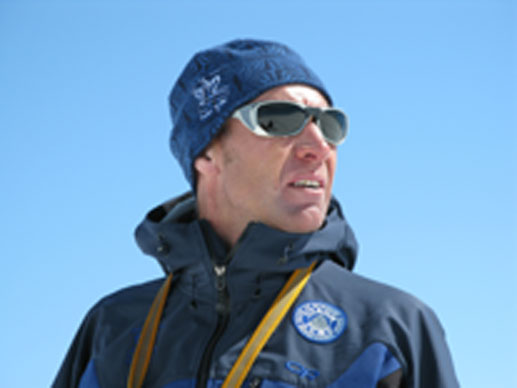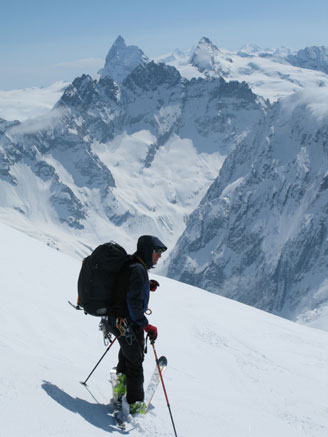|
|
Auf Deutsch |
|
Home |
or Guide Service Choosing a climb Info Contact Us


|
|
|
|
|
|
About Swiss Guide Intro Background Specialization Qualifications Philosophy Top
Intro Background Specialization Qualifications Philosophy Top Born in Beatenberg, Switzerland and
living
in Park City,
Intro Background Specialization Qualifications Philosophy Top
Intro Background Specialization Qualifications Philosophy Top Because I am a resident of both Europe and the USA, my years of guiding on both continents have provided me with the knowledge and experience paramount to a competent mountain guide. My specialty is putting together individual programs covering all phases of the tour. I help prepare the individual in training and nutrition. I can asses the degree of acclimatization necessary as well as provide experienced information on the best season and conditions for a given tour. For prices check Booking and General Information Reservations: Advance reservation is required (see our website for registration). In particular for overseas trips, we need 3 to 6 months advance registration before the scheduled climb in order to reserve huts and hotels during the busy seasons. Because of extreme climate conditions, climbing big peaks can be a challenge. Storms come in faster and more severely then in the past, which influences the decisions needed to provide a safe trip. As pilots say: "Looking up to the sky wishing I was flying is better then being in the air wishing I was the safe on the ground" What does that mean? Once you make a booking, I reserve my time for you; huts/hotels are reserved; and all the other logistics are in place. However, the weather is a factor that cannot be "booked". That means, if we cannot do the climb, for example the Eiger, I will do another climb with you. There will be options and climbs at lower elevations. It is impossible to predict what the weather will be at the time of your booked tour, but if you do book, and the weather does not allow for the precise climb for which you booked, Swiss guides will offer you an alternative. If you do not wish to do an alternative climb in this situation, I recommend trying to book at the last minute. However, you run the risk of the huts not having room for late bookings as well as no guides being available. Huts are first come first serve for those without reservation which means that in high season, there is a good chance that the hut will be full. If you are living in Europe this is a reasonable option, as you can call to see if the huts have room; however, if you are traveling from far, this option is not ideal.
Intro Background Specialization Qualifications Philosophy Top As a professional guide it is my obligation to inform
each and every one of my guests about my philosophy. I offer the experience
of the journey
as well as the flavor
of the Swiss culture
and not just
the
peak. My experience
in guiding
goes
back some time, and I find
it best to do a preparation climb for more difficult climbs.
This allows us to get to know each other,
and it gives me a chance to assess each client’s climbing skill level. It gives
me time to help you improve your skills, adapt your pace and
assist you in getting used to
the short roping style we use in Europe. It also guarantees
you a higher success rate on climbing the mountain of
your dreams. Once we have
done our warm up climb, I will let you know if you can do a harder
climb or if we need to adjust the goal to a less demanding climb. If I
determine while on a climb that a client is technically or
physically not capable of completing the climb, for their safety and
well being, I will cancel that particular climb for which they
contracted and offer one that is appropriate to their skill level. A note on being well within your physical and technical abilities on any given climb: unlike many other sports whereby people try to challenge themselves technically and to the edge of exhaustion, these are not safe options in mountaineering. If we are far from any hut or shelter when you reach your exhaustion level, simply stopping is not possible. In fact it may be that we have to go on for hours before reaching safety. We can have a little play room with the conditions and weather to a certain point, but physical and technical skills should not be tested in a mountain setting. We can do so in a safer environment such as short routes. To tackle a big mountain, one should have had experience on many similar climbs of that grade or harder. This ensures safety on the mountain! Mountaineers should not need any encouragement to go on while on a climb. As mountaineers we do not conquer peaks, we do it for ourselves to accomplish something, to stand in awe at the beauty of the mountains and to stay fit and give meaning to life. I believe all mountain guides should be certified through nationally and internationally recognized mountain guide associations such as the UIAGM/IFMGA. A certified guide is trained in the latest guiding and rescue techniques and has to go through a rigorous certification process. When a client entrusts their life to me, I consider this is a grave responsibility, one that drives my decision-making on a climb. This trust has manifested itself into close relationships with my clients, who have kept in contact with me throughout the years. I believe in no "great or the best guides". The only "good" guide is the one who makes it to old age! It is impossible to mountaineer totally risk-free, but without limiting risks, we do not accomplish anything we want get old enough to tell the story. Look at Reinhold Messner, for example, he is known as very safe climber and for always trying to avoid taking risks! We like happy and returning clients! Freddy Grossniklaus
Swiss Guide always uses and recommends high-end outdoor equipment. In rugged and hard mountain conditions all around the globe, these products provide the high level of quality that ensures safety and comfort, allowing us to focus on what we like to do most: “ climbing”!
|
|
|
|
|
|
|
|
|
|
|
|
Home
About
Ski
Mountaineering
Avalanche
Glacier
Rock
Prices
Choose
Registration
Contact
Hiking
Climb
©2021, Swiss Guides LLC info@swissrockguides.com |
|
|
|
|
|






 Freddy
a Swiss/American, has been climbing and guiding internationally
for over 30 years. He has been climbing
and skiing all
in New Zealand, Australia, America, Alaska and the Alps
since he was
a child. He
is an IFMGA certified mountain guide & an American Mountain
Guide Association (AMGA) Alpine, Rock and Ski Mountaineering
certified guide as well as a certified ski, certified
alpine ski racing coach level 300 and Telemark instructor. He
works as an instructor/examiner for the AMGA in their guide
certification program. He has been an examiner/ instructor for the Swiss
Instructor Association for the ski and avalanche program for 13 years.
Works currently as an alpine ski racing head coach for the RLZ
Jungfrau (Regional High Performance Center Jungfrau.)
Freddy
a Swiss/American, has been climbing and guiding internationally
for over 30 years. He has been climbing
and skiing all
in New Zealand, Australia, America, Alaska and the Alps
since he was
a child. He
is an IFMGA certified mountain guide & an American Mountain
Guide Association (AMGA) Alpine, Rock and Ski Mountaineering
certified guide as well as a certified ski, certified
alpine ski racing coach level 300 and Telemark instructor. He
works as an instructor/examiner for the AMGA in their guide
certification program. He has been an examiner/ instructor for the Swiss
Instructor Association for the ski and avalanche program for 13 years.
Works currently as an alpine ski racing head coach for the RLZ
Jungfrau (Regional High Performance Center Jungfrau.)

 conditions
may be the reason I choose to cancel the tour and offer an
alternative climb or cultural tour.
conditions
may be the reason I choose to cancel the tour and offer an
alternative climb or cultural tour. 







